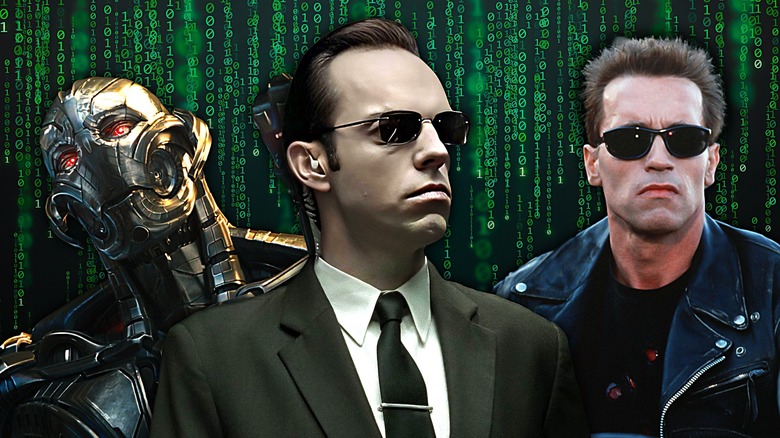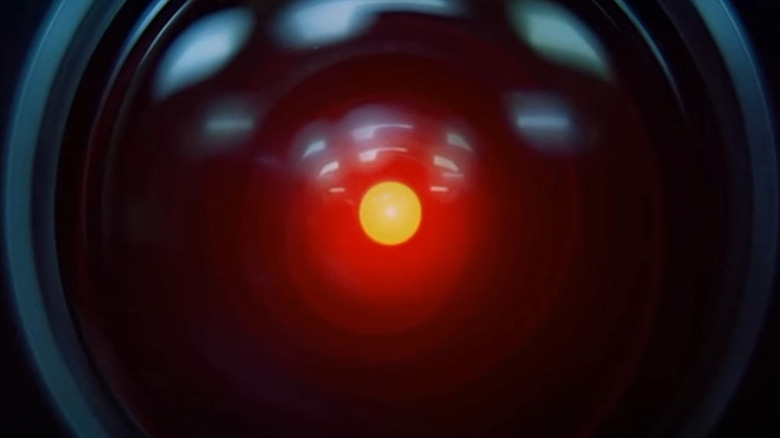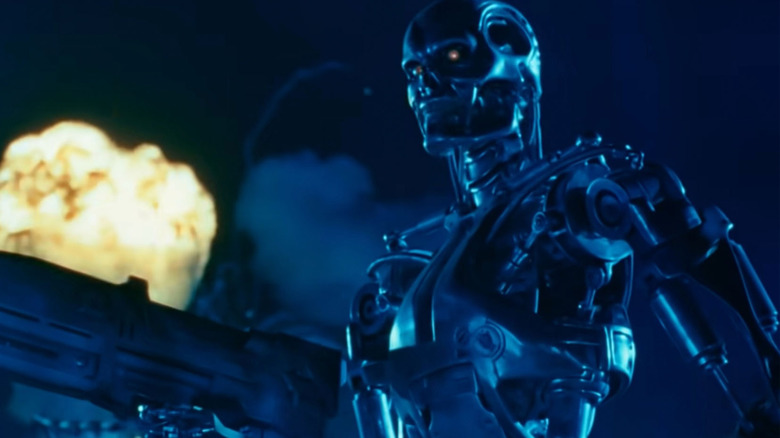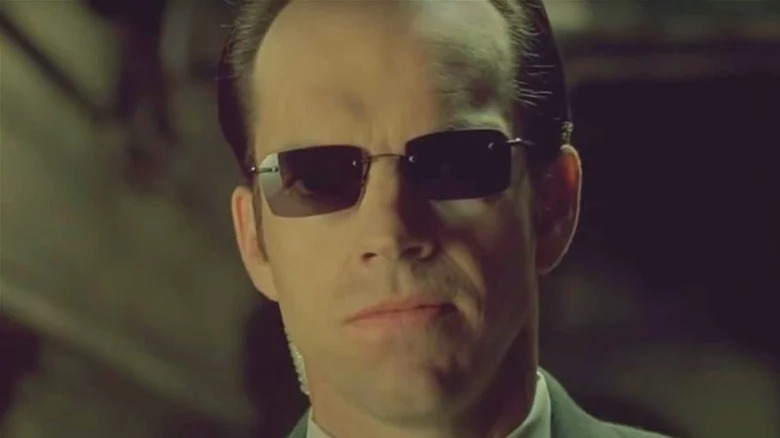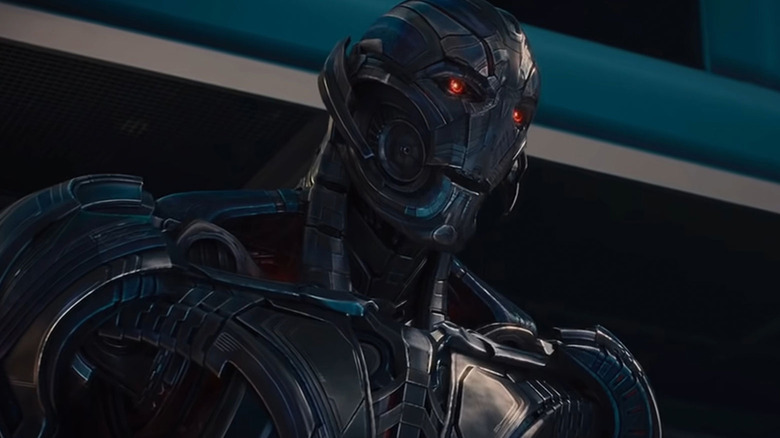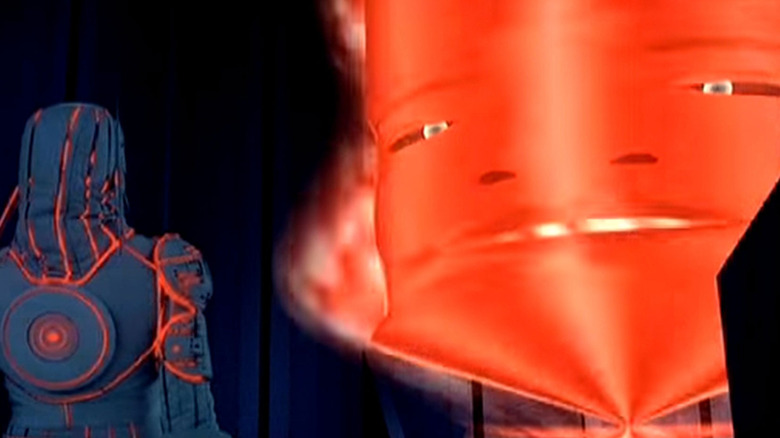The 5 Best AI Villains In Movie History, According To Artificial Intelligence
All of Looper's content is written and edited by real, live humans. We do not use AI chat tools to write our content.
AI might be getting used to creating fan art and videos of cats with five legs, but we're a little more direct here at Looper. To gauge where AI is at the moment, we dared to ask ChatGPT the unthinkable — which are the five best artificial intelligence villains in movie history? You know, for science or whatever. From sociopathic supercomputers to shiny-headed Marvel villains, movie history has been plagued with manufactured monsters that show signs of severely bad wiring. But in the eyes of ChatGPT, which ones are a cut above the rest of the production line (which we hope it's not taking notes from)?
There are some memorable metallic threats out there. The no-nonsense ED-209 from "Robocop" had its issues with either businessmen or being able to keep steady. Then there was dove-loving deserter Batty (Rutger Hauer) from Ridley Scott's "Blade Runner." However, incredibly, these guys didn't make the cut of quintessential electrical adversaries that ChatGPT believed did a good job. Should we be afraid? Probably.
HAL 9000 is 100% an AI to avoid
When considering which AI adversaries are worth worrying about, you must include Stanley Kubrick's construction with a super-smooth voice and murder on its mind in "2001: A Space Odyssey," and ChatGPT agrees. HAL 9000 is one of the best and most simplistic bits of artificial intelligence, and according to the aforementioned program, it has winning traits that make it so. "Its calm demeanor and voice juxtaposed with its murderous intent make it one of the most memorable AI characters in film history," ChatGPT told us.
Figuring out why HAL is considered such a technological horror is not too difficult. Like other entries on this list, his super-chill attitude of taking out the humans around him makes him so unnerving. Reading lips and messing with ships, HAL is one of the great lessons on why letting a human-made intelligence take over the place might not be the best idea, especially given how many of the worst traits of humanity it manages to display.
When Dave Bowman (Keir Dullea) makes the move to pull the plug on the supercomputer that's been killing off his shipmates, HAL pleads for its life when there isn't one. Does it really feel afraid, or is it another part of his program to stay online and avoid a wonderful rendition of "Daisy"? Like so many other mysteries of Kubrick's stunning sci-fi movie, we never really know, but one thing is certain — HAL is one scary heuristically programmed algorithmic computer.
Skynet ensures Judgement Day is inevitable
Arnold Schwarzenegger's emotionless assassin might be a terrifying menace bent on completing its mission, but what you should really be worried about is the self-aware program that sends out the Terminators in the first place, Skynet. As much as we're told they absolutely will not stop, Terminators can be crushed or melted down, but Skynet will always have another to send out of the production line and have the prep time to do so. Making ChatGPT's winning list, Cyberdyne Systems' coveted creation seemingly earned a mention for its foresight of seeing humanity as a threat and then infiltrating everything to turn the world on itself before powering up its plans post-Judgment Day.
Perhaps that makes Skynet the scariest out of these electronic evils because, unlike other bad guys on this list, its plan actually works. As "Terminator 3: Rise of the Machines" reveals, Judgment Day is inevitable. The world is thrown into darkness; kids' playgrounds are left in a horrific, ashy coating; and it's left to John Connor, leader of the human resistance, to pull humanity from the brink of extinction. He can believe as much as he wants that "the future is not set," but Skynet has repeatedly proven it can't be terminated and will always be there to reset its plans when needed.
Agent Smith is a corrupt cure for the disease of humanity
It makes sense just as much as it scares us to our bones that ChatGPT considers Hugo Weaving's monotone monster in a suit and shades one of the best AI villains out there. When Agent Smith arrived in "The Matrix" in 1999, he brought a stern-faced foil to Keanu Reeves' Neo whose focus on and understanding of humanity was reasonable and rightfully unsettling. With Agent Smith deeming the human race "cancer" and agents the cure to be rid of it, things get even more outrageous when Smith is defeated for the first time by Mr. Anderson, only to come back and have a different agenda, which is why he was deemed one of the best bad guys.
According to ChatGPT, "Agent Smith evolves into a rogue AI with the goal of destroying both the Matrix and the real world, making him a unique and formidable villain." It certainly has a point. After the first film, Smith breaks from the prison he hates so much and becomes something even more frightening — his own person. By going on this solo mission and ultimately showing how bad things can happen from escaping the Matrix, Smith sets out to play each side against the other until all that's left is him, or as he puts it after replicating himself, "Me, me, me." That really is a world worth taking the blue pill for to forget it could ever happen.
Ultron is a philosophical and fearsome threat
"When the Earth starts to settle, God throws a stone at it. And believe me, he's winding up." James Spader's stringless self-aware AI in "Avengers: Age of Ultron" might not be a favorite among MCU fans, but he's enough of a threat to make it on ChatGPT's list as another sinister villain worth some attention. When breaking down the brainchild of Tony Stark (Robert Downey Jr.) and Bruce Banner (Mark Ruffalo), the chatbot deemed Ultron a worthy contender because "its god-complex and philosophical musings on humanity's worth make it a compelling and menacing foe."
That's certainly the case, but just like Agent Smith, Ultron, regardless of being out for Earth's Mightiest Heroes, is all the more intimidating because of the evident characteristic traits he takes from Tony.
Angered at even being compared to his maker in the iron suit, Ultron has a darkly funny perspective on the world, and his plans for it make him such a compelling villain. After Thanos (Josh Brolin), he's perhaps one of the few other bad guys in the MCU whose opinions actually hold some weight and have you scarily agreeing with where he's coming from. In his shiny red eyes, "peace in our time" is one with humanity's extinction. It's almost a shame that — excluding "What If...?" — the unhinged Ultron program doesn't find itself back online as a returning threat to the MCU for whenever the new Avengers are formed. Almost.
The Master Control Program (MCP) makes some dangerous moves
Some of the most impressive computer programs are the ones that take winning elements from others. In the case of the Master Control Program (MCP), the big threat in "Tron" feels like Skynet posing as a video game. Of course, this massive-faced foe isn't playing around and has plans for the real world and the forces that could quickly turn against one another within it. Broken down by ChatGPT, the MCP deserves a spot on its list because "it seeks to expand its power beyond its own system, even attempting to hack into Pentagon and Kremlin databases, showcasing its ambition for control and dominance." Good to see what checks all your boxes, ChatGPT.
Admittedly, it might not have as much of an imposing presence as the rest, given that it looks like what would happen if you spliced a lizard with an oversized traffic cone. Regardless of its appearance, though, the Master Control Program's aims make it enough of a force to be reckoned with. Thankfully, though, via its hardwired hubris, it creates its own undoing after digitizing Kevin Flynn (Jeff Bridges) and plays a part in bringing down the MCP once and for all, reverting it to nothing more than a chess program. Checkmate.
